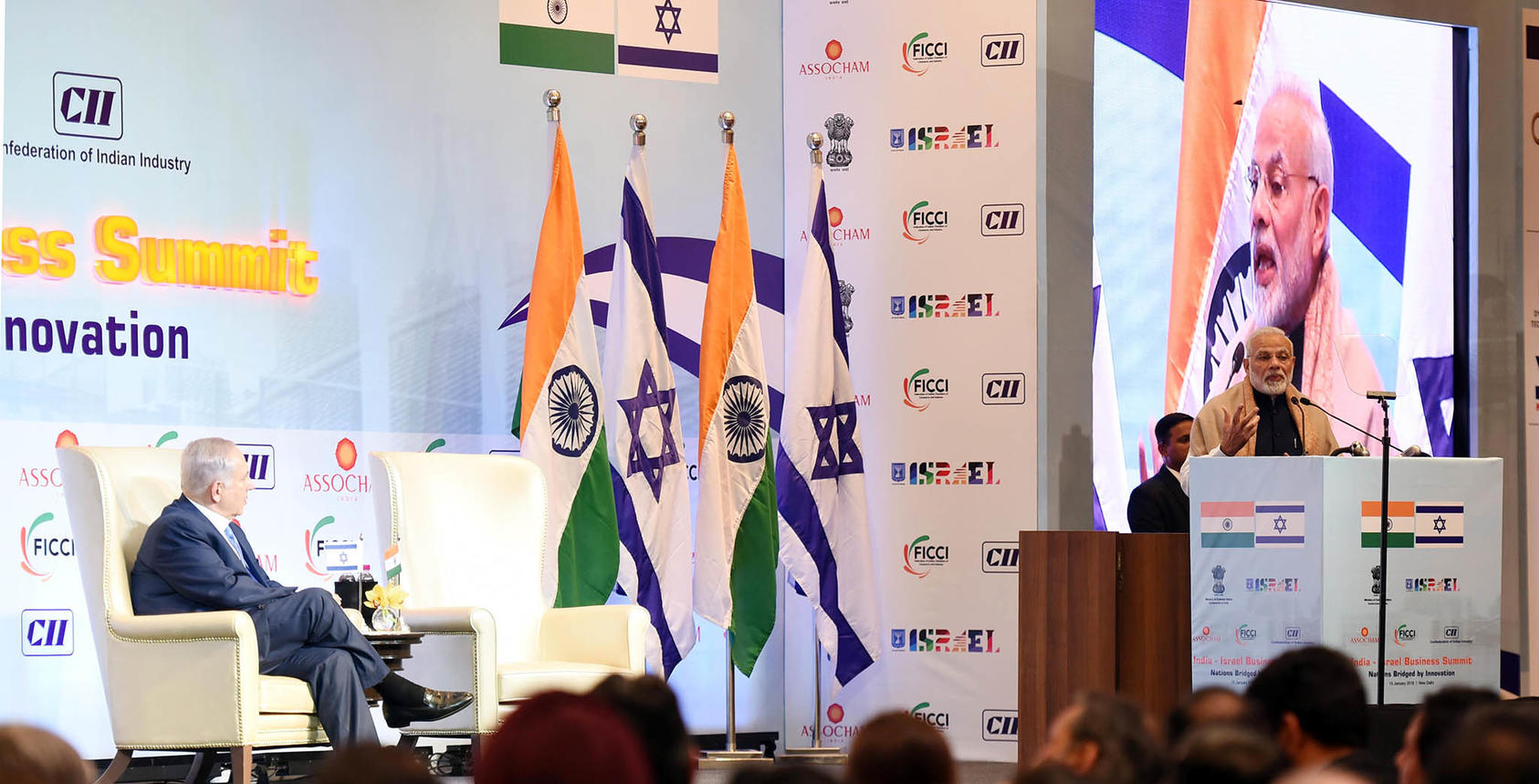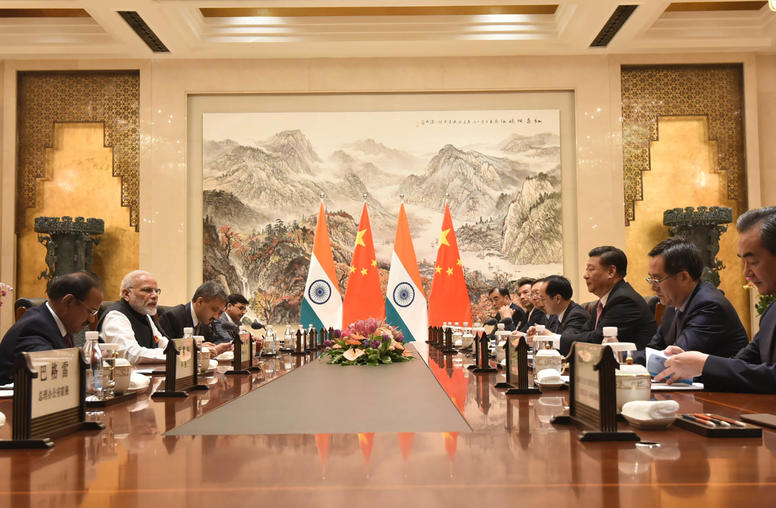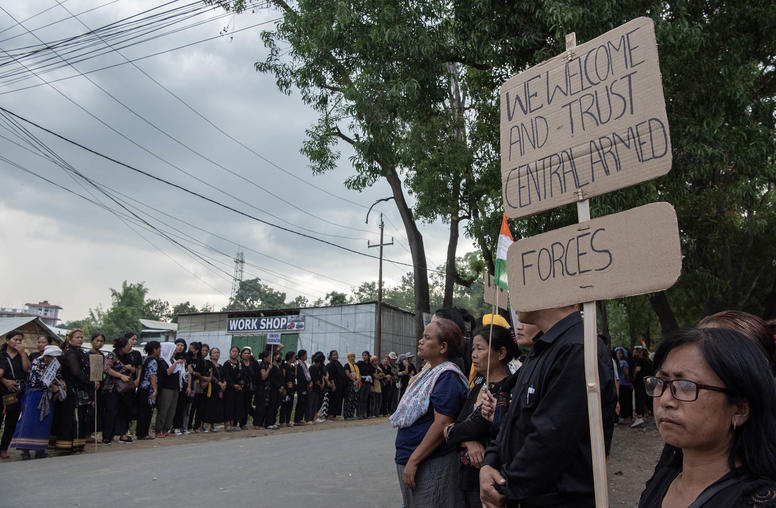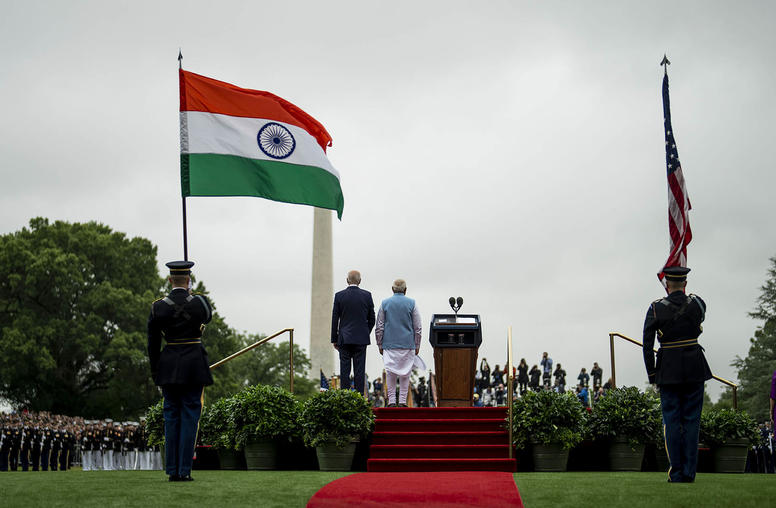Amid War in the Middle East, India-Israel Ties Reach New Milestone
The U.S. should not see India’s support for Israel as evidence of a broader alignment with Washington, as New Delhi sees the war through a different prism.
India’s official response to the Israel-Hamas war reflects a meaningful and likely durable strategic tilt toward Israel by Prime Minister Narendra Modi and his ruling Bharatiya Janata Party (BJP). Yet India’s shift should not be misinterpreted as a broader alignment with the United States or any other “camp” in this bitter contest. The maxim that Indian External Affairs Minister S. Jaishankar has repeated in other fraught geopolitical contexts holds equally true for India’s stance in the Middle East: “Do not think it’s necessary for India to join any axis. India is entitled to make its own choices which will be a balance of its values and interests.”

Consequential Tweets, and a Vote
The first indicator of India’s response to the Israel-Hamas war came on October 7 when Modi tweeted “India’s solidarity with Israel at this difficult hour.” Jaishankar quickly retweeted the message. Three days later, Modi tweeted his thanks to Prime Minister Benjamin Netanyahu for a phone conversation, adding that the “People of India stand firmly with Israel in this difficult hour. India strongly and unequivocally condemns terrorism in all its forms and manifestations.” Although on October 12 the Indian Ministry of External Affairs reiterated India’s longstanding position in support of a two-state solution for Israel and Palestine, on October 18 in the immediate aftermath of the Al-Ahli hospital blast, Modi pointedly avoided fixing blame on Israel, tweeting only general condolences and concern. Then, on October 27, New Delhi joined 44 other countries in abstaining from the symbolic United Nations General Assembly resolution for a humanitarian cease-fire in Gaza.
For some outside observers, evidence of India’s policy shift toward Israel might appear subtle, even inconsequential. Indeed, unlike the United States (and 13 other countries), India did not oppose the U.N. cease-fire resolution outright, much less offer material support for Israel’s cause. But the significance of Modi’s moves was clarified in an op-ed penned by Sonia Gandhi, the leader of India’s Congress Party, the principal national opposition to Modi’s BJP. On October 30, she observed, “The Prime Minister had made no mention of Palestinian rights in the initial statement expressing complete solidarity with Israel.” She added, “The Indian National Congress is strongly opposed to India’s abstention on the recent United Nations General Assembly Resolution.”
Although Gandhi was careful to condemn Hamas for its terrorism, her essay reflected a traditional Indian sympathy for the Palestinian cause largely absent from Modi’s statements. Read in this context, Modi’s tweets and U.N. vote represented a new milestone in India’s increasingly close ties with Israel.
Drivers of the Tilt
India’s tilt toward Israel is partly a decades-long evolution. After independence, a powerful post-colonial attachment to the Palestinian cause reigned supreme in New Delhi. Only after the Oslo peace process was underway in 1992 did India open formal diplomatic ties with Israel. Over the subsequent decade, a burgeoning if still understated defense and technology partnership brought Israeli Prime Minister Ariel Sharon to New Dehi in 2003. By then, Israel was already India’s second-largest arms supplier after Russia.
Yet only Modi ushered India’s relations with Israel completely out of the shadows. In 2017, he took a celebrated and much-photographed trip to Israel, the first for any Indian prime minister. Then in 2018, he feted Netanyahu in New Delhi. The Modi-Bibi “bromance” captured headlines in both nations, as the two took pains to play up their partnership.
More than personal, leader-level affinities, however, broader changes in India’s geopolitical approach to the Middle East during Modi’s tenure complemented and reinforced the logic of India’s existing ties to Israel. In particular, India deepened its economic and diplomatic ties with the Arab Gulf states, especially the UAE, diversifying from a history of closer relationships with Iran and Egypt. These shifts coincided with the gradual thawing of relations between the UAE and Israel, which ultimately culminated in the 2020 signing of the Abraham Accords.
From there, it was a relatively small step to creative diplomatic initiatives like the “minilateral” I2U2 that first brought together the foreign ministers of India, Israel, UAE and the United States in 2021, and the recent announcement of the India-Middle East-Europe Economic Corridor, an ambitious transregional connectivity plan announced on the sidelines of the 2023 G20 summit in New Delhi. All told, Modi’s India was an eager partner in Israeli efforts to envision and realize a “New Middle East” defined by forward-looking economic, technological, trade and transit initiatives intended to preserve and extend gains from globalization even in an era of rising global geopolitical competition.
India’s Interests
Whether or not the Hamas attacks of October 7 were explicitly and primarily intended to disrupt the emergence of a new Middle Eastern order founded on normalized political and economic ties between Israel and the Gulf, Modi’s India now has a major stake in avoiding any regional military escalation that would destroy such prospects for good. Thus, whatever sympathy Indians may have for Palestinian civilians, New Delhi has none for Hamas or its backers in this fight. A quick Israeli victory followed by the imposition of a Gulf-friendly governing authority in Gaza would serve Modi’s purposes better than any other outcome. If instead the flames of Gaza ignite the wider region in war, India would see its past diplomatic investments go up in smoke and, worse, could face the dangerous prospect of a reinvigorated terrorist threat at home as well.
Of course, Modi’s posture is not solely informed by an enlightened international vision. The BJP’s Hindu nationalist identity is the main lens through which its members, including Modi, perceive the conflict between Israel and Hamas. India’s Hindu chauvinists see Israel much like they imagine India: as an ethnonationalist majoritarian state facing the existential threat of Islamist terrorism. More than that, they have doubled down on a securitized approach to dealing with their own political opposition and restive minorities that has led them to pursue extensive consultations with Israeli security experts as well as to purchase Israeli hardware and software originally intended for counterterror and related security missions. Rather than backing off this approach, as Modi steers the BJP into national elections in 2024, he will aim to bolster his credentials with hardline voters as a muscular defender of India’s Hindu majority, committed to countering terrorism at home and to supporting like-minded partners abroad.
The Global Response
Obviously, Israel has welcomed India’s tilt with open arms. Israelis will not soon forget who stood with them in this conflict. Israel’s supporters in Washington will also see the tilt as a positive development. However, they would be wrong to interpret it as evidence that India has adopted President Biden’s vision of the Middle East conflict as a battle in the global defense of democracy any more than New Delhi has adopted that characterization of the Russia-Ukraine war. To the contrary, the Israel-Hamas war means something very different to New Delhi, and especially to India’s Hindu nationalists.
Finally, although India has bucked the prevailing trend in the Global South by its abstention in the United Nations General Assembly, New Delhi may not need to fear too much that it has jeopardized its place as one of the leaders within that extremely diverse group of nations. It is true that China — arguably the top aspirant for leadership in the non-Western world — has so far cast its lot against Israel in an effort to demonstrate its “anti-colonial” bona fides to those who frame the struggle in these terms. However, New Delhi would be correct to see Beijing’s move as a hollow gesture, unlikely to be followed up with serious diplomacy or to win lasting appreciation in the Global South. In the process, it will jeopardize Beijing’s ties with Jerusalem in ways that will further open the door to a durable India-Israel partnership.



